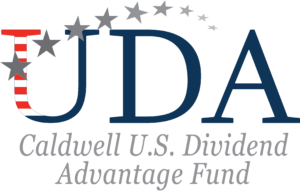In November, the Caldwell U.S. Dividend Advantage Fund (“UDA”) gained 2.4% versus 2.8% for the S&P 500 Total Return Index (“Index”). Top performing sectors in the Index were Information Technology, led by heavyweights such as Apple and Nvidia, and Consumer Discretionary, similarly buoyed by sector heavyweights such as Amazon and Home Depot (discussed below). All other sectors finished the month in negative territory with Financials and Energy as notable underperformers. Financials saw widespread selloffs of major U.S. banks while Energy underperformance was due to declining oil prices. Both Financials and Energy sold off particularly hard in the final trading days of the month given concerns about the new Omicron variant and its potential impact on spending and travel.
Top contributors to UDA performance in November were Tetra Tech (“TTEK” +8.8%), Broadcom (“AVGO” +7.8%) and Home Depot (“HD” +11.5%)2.
TTEK moved higher following strong earnings and the finalization of a new large scale infrastructure bill in the U.S. The company’s backlog continues to grow while a mix shift toward software-type services helps drive margin expansion.
AVGO’s software-focused analyst day gave investors greater clarity on this part of the business, where the company is seeing strong momentum converting core customers to larger and longer term subscription-based contracts. Given lower cyclicality and higher than corporate average margins, progress in the software business should help drive improved profitability and reduced earnings volatility over time.
HD also posted another strong quarter driven by the return of larger projects previously shelved during the pandemic. The company is leveraging its scale advantages to get better in-stock positions versus smaller peers, in some cases gaining sole supplier status. As it completes a large investment cycle, we believe margins will inflect upward and their strong competitive position should drive continued share gains.
While economic disruptions resulting from the Omicron variant may pose a risk to the market’s recovery, we believe UDA, with its unique momentum-driven investment approach and focus on well-managed, dividend growth companies, is well positioned to provide strong performance in challenging environments. We expect that dividend growth investing, which has been foundational to the Fund’s investment approach, will continue to provide a means of generating attractive risk adjusted returns for our investors over the long-term.
1Standard performance as at November 30, 2021:
Caldwell U.S. Dividend Advantage Fund Series F: 1 Year: 17.94%, 3 year: 14.52%, 5 year: 11.07%, Since Inception (June 19, 2015): 10.39%.
S&P500 Total Return Index: 1 Year: 26.63%, 3 year: 18.97%, 5 year: 16.80%, Since Inception (June 19, 2015): 15.70%.
2Actual investments, first purchased: AVGO 11/1/2018, TTEK 9/25/2020 and HD 11/2/2020.
All data is as of November 30, 2021 sourced from Morningstar Direct or S&P Capital IQ,, unless otherwise indicated. Fund returns are from FundData. UDA, Index total return numbers, sector returns and individual stocks returns are in CAD terms. The Fund was first offered to the public as a closed-end investment since May 28, 2015. Effective November 15, 2018 the Fund was converted into an open-end mutual fund such that all units held were redesignated as Series F units. Performance prior to the conversion date would have differed had the Fund been subject to the same investment restrictions and practices of the current open-end mutual fund.
The information contained herein provides general information about the Fund at a point in time. Investors are strongly encouraged to consult with a financial advisor and review the Simplified Prospectus and Fund Facts documents carefully prior to making investment decisions about the Fund. Commissions, trailing commissions, management fees and expenses all may be associated with mutual fund investments. Rates of returns, unless otherwise indicated, are the historical annual compounded returns including changes in unit value and reinvestment of all distributions and do not take into account sales, redemption, distribution or optional charges or income taxes payable by any unitholder that would have reduced returns. Mutual funds are not guaranteed; their values change frequently and past performance may not be repeated. The payment of distributions should not be confused with a fund’s performance, rate of return or yield. If distributions paid are greater than the performance of the fund, your original investment will shrink. Distributions paid as a result of capital gains realized by a fund, and income and dividends earned by a fund, are taxable in your hands in the year they are paid. Your adjusted cost base (“ACB”) will be reduced by the amount of any returns of capital and should your ACB fall below zero, you will have to pay capital gains tax on the amount below zero.
Publication date: December 13, 2021.
12303168464egw4gwe4g

